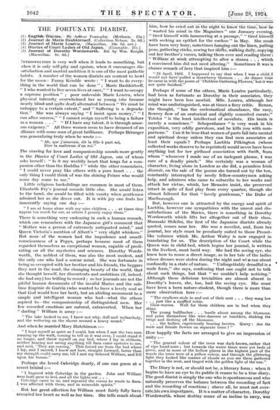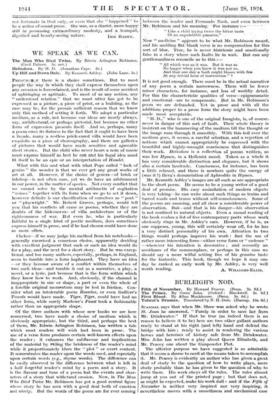THE . FORTU ATE DIARIST.
• (Macmillan. 8s. 6d.)
INTROSPECTION is very well when it leads to something, hilt when it is only self-pity_ and egoism, when it encourages dis- satisfaction and morbid ambition it is one of the most pathetic habits. A number of the women diarists are content to howl for the moon : Fanny Kemble wrote " I want to do every- , thing in the world that can be done " ; Marie Bashkirtseff, " I who wanted to live seven lives at once," " I want to occupy a supreme position " ; poor unlovable Marie Leheru, when physical infirmity overwhelmed her so young_ (she became nearly blind and quite deaf) alternated between " We must be unhappy to a certain extent," and " Suffering is a degrada- tion." She was always saying " I insist upon money," " I run after success," " I cannot resign myself to being a failure
as a woman . . ." " If I have any talent, it is through amor- ous exigency." All three women seem to have dreamed of an alliance with some man of great brilliance. Perhaps Beranger was generalizing truly when he wrote :- " Ah, quo j'aimerais, dit la fille a part soi, Etre la maitresse d'un roi."
The craving for love and companionship sounds more gently in the Diaries of Court Ladies of Old Japan, one of whom asks herself : " Is it my worldly heart that longs for a com- panion other than the Buddha ? " while the other remembers, " I could never pray, like others with a -pure heart . . . the
only thing I could think of was the shining Prince who would some day come to me."
Little religious backslidings are common in most of them.
Elizabeth Fry's journal records little else. She would listen to the band, she would be filled with vanity when gentlemen
admired, her as she drove out. It is with joy one finds her innocently saying one day :—
" I am-at home alone with my nine children . . . at times they appear too much for me, at others I greatly enjoy them."
There is something very endearing in such a human remark,
which one remembers with the Japanese girl's comment that " Mother was a person of extremely antiquated mind," and Queen Victoria's mention of Albert's " very slight whiskers." But none ' of the women hid the impudence and unself- consciousness of a Pepys, perhaps because most of them regarded themselves as exceptional women, capable of predi-
cating on all the mysteries and sciences. Dorothy Words- worth, the noblest of them, was also the most modest, and the only one who had a serene mind. She was fortunate in being so occupied with her brother and his friends, the beggars they met in the road, the changing beauty of the world, that she thought herself, her discontents and ambitions (if, indeed, she had any) too trifling to record ; so her journals are not the pitiful human documents of the invalid Marks and the sub- lime Eugenie de Guerin (who wanted to have a lovely soul so that God would love her best), but an abiding monument to a simple and intelligent woman who had—what the others aspired to—the companionship of distinguished men. Her
few recorded emotions are natural, extraverted. When her " darling " William is away :—
" The lake looked to me, I knew not why, dull and melancholy, and the weltering on the shores seemed a heavy sound."
And when he married Mary Hutchinson :— " I kept myself as quiet as I could, but when I saw the two men running up the walk, coming to tell us it was over, I could stand it no longer, and threw Myself on my bed, where I lay in stillness, neither hearing not seeing anything till Sara came upstairs to me, and said, They are coming,' This forced me from the bed where I lays and I Moved; I knew not how, straight forward, faster than my strength could carry me, till I met my beloved William, and fell upon his bosom."
Perhaps she loved Coleridge dearly, if one can guess nt a secret behind ;— , " I lingered, with Coleridge in the garden. John and William were both gone to bed, and all the lights out . . . • Coleridge came to us, and repeated the verses he wrote to Sara. k was affected with them, and in miserable spirits."
But her great affection for William must fairly fully have occupied her heart as well as her time. She tells much about
him, how he cried out in the night to know the time, mow tle " wasted his mind in the Magazines " one January evening, " tired himself with hammering at a passage," " tired himself 'with seeking an epithet for the cuckoo " in May. She muit have been very busy; sometimes hanging oht the linen, pulling peas, gathering sticks, sewing her Slats, walking dairy-, copyi*
out her brother's verses, talking them over and reading them': " William" at work' attempting to alter a stanza -. „ which I convinced him did not need altering." Sometimes it was 'a chance remark of hers that inspired him :—
" 28 April, 1802. I happened to 'say that when I was a child,,I would not have pulled a strawberry blossom . . . At dinner time he came in with the poem of Children Gathering Flowers,' but it was not quite finished."
Perhaps if some of the others, Marie -Leneru particularly, had been as fortunate as Dorothy in their associates, they might have been less morbid. Mlle. Leneru, although her mind was undistinguished, was at times a fiery critic. Renan, she thought, " has the ecclesiastical abundance, the easy, flowery flow of an oratorical and slightly conceited curate:"
Tolstoi " is the least intellectual of novelists. His brain is merely a conscience." Schopenhauer " is very, weak in his exposition, very oddly garrulous, and he kills you with coin- parisons." Can it be true that women of parts fall into mental and spiritual decay unless they can find men associates at least their equals ? Perhaps Laetitia Pilkington (whose collected works deserve to be reprinted) would never have been anything but for her girlhood association with Swift, from whom " whenever I made use of an inelegant phrase, I was sure of a deadly pinch." She certainly was a woman of character, living alone in London as she did, a penniless Irish
divorcée, on the sale of the poeMs she turned out by the ton, constantly interrupted by needy fellow-countrymen asking help, and admirers who came to subscribe to her works and attack her virtue, which, her Memoirs insist, she preserved intact in spite of foul play from every quarter, though she almost faltered for that " lovely gentleman," the Duke of
Marlborough.
But, however one is attracted by the energy and spirit of Laetitia, however one sympathizes with the unrest and dis- satisfactions of the Marks, there is something in Dorothy Wordsworth which lifts her altogether out of their class. Murasaki Shikibu, the first"of the Japanese diarists already quoted, comes near her. She was a novelist, and, from her journal, her style must be peculiarly suited to those Proust- like volumes which Mr. Arthur Waley is now engaged in translating for us. The description of the Court while the Queen was in child-bed, which begins her journal, is written in the liveliest, most lucid way. She had the seeing eye, she knew how to rouse a direct image, as in her tale of the ladies whose dresses were stolen during the night and wl o ran about confusedly in a state of nature. ":Unforgettably dreadful is a nude form," she says, confessing that one ought not to talk about such things, but that " we couldn't help noticing." Although these delicious trivialities are almost absent in Dorothy's leaves, she, too, had the seeing eye. She must have been a born nature-student, though there is more thin mere obsersiation here
" The swallows stole in and out of their nest . , . they sung low . . . just like a muffled robin.
Glow-worms. Well for them children are in bed when they shine.
The young bullfinches . . . bustle about among the blossoms, and poise themselves like wire-dancers or tumblers, shaking the twigs and dashing off the blossoms.
. . . the hales, capriciously bearing berries. Query : Are the male and female flowers on separate trees ? "
How happily the facts are arranged to give an impression of unity :—
" The general colour of the trees was dark-brown, rather that of ripe hazel-nuts ; but towards the water there were yet beds of green, and in some of the hollow places in the highest part of the woods the trees were of a yellow colour, and through the glittering tight they looked like masses of 'clouds as you see them' gathered together in the west, and tinged with the golden light of the sun."
The Diary is not, or should not be, a literary form ; when it begins to have an eye to its public it ceases to be a true diary.
The good diarist is simply the one who is spontaneous and who naturally preserves the balance between the recording of fact and the recording of reactions abbve all, he must not over- rate...his nwaimportAnce_i It is a matter of character; Dorothy Wordsworth. whose destiny many of us incline to envy, was _ not fortunate in that only, or even that she " happened " to be a writer of sound prose. She was, as a diarist,-morehappy- still in pospessing extraordinary modesty, and a ;tranquil, dignified and beauty-seeing' nature. Iars BARRY.















































 Previous page
Previous page